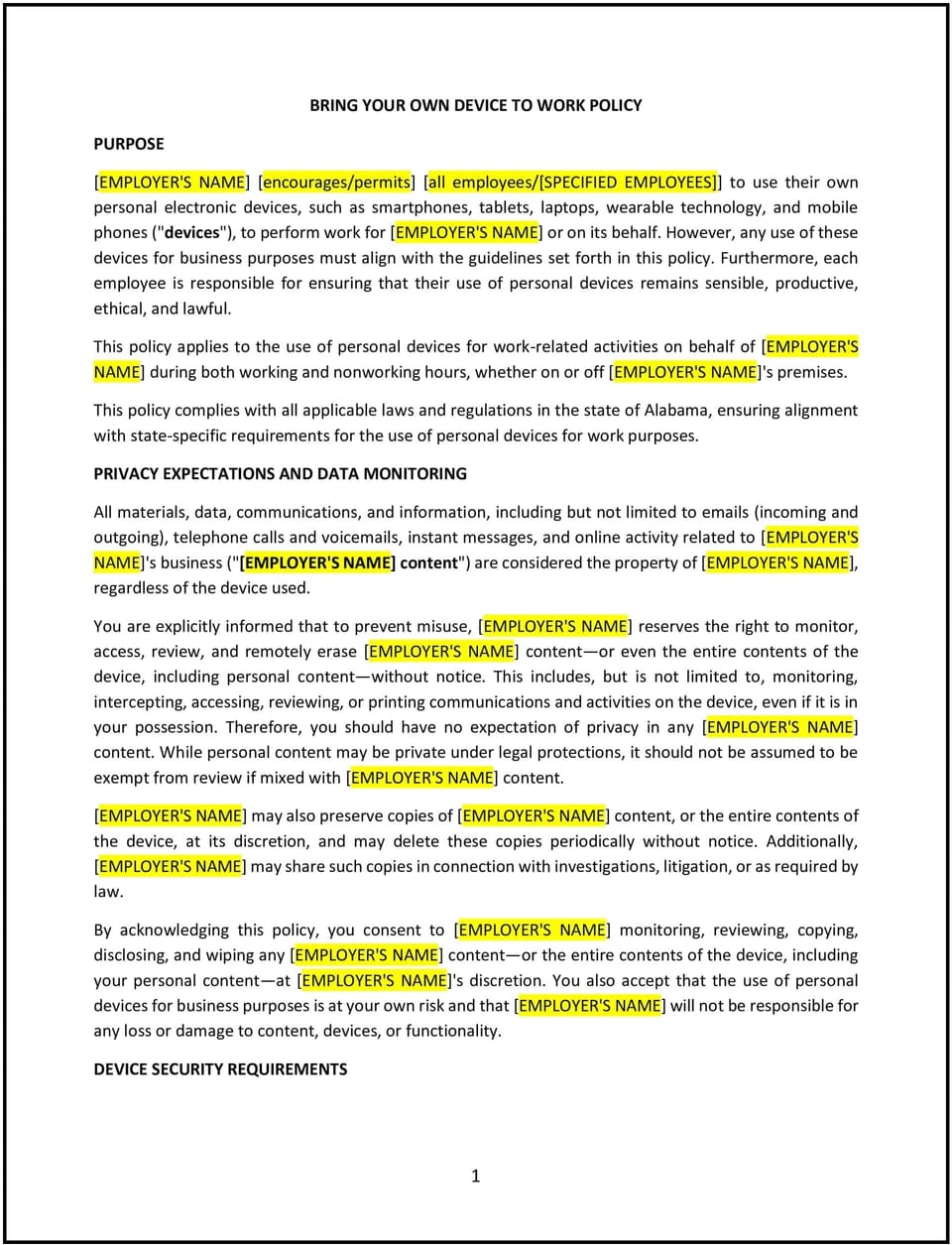Bring your own device to work policy (Alabama): Free template

Bring your own device to work policy (Alabama)
A bring your own device (BYOD) policy allows employees to use personal devices such as smartphones, laptops, or tablets for work purposes. In Alabama, this policy helps businesses outline clear rules for device usage, security, and data protection, ensuring compliance with applicable federal regulations and organizational standards. Tailoring this policy helps mitigate risks while promoting flexibility and productivity in the workplace.
How to use this bring your own device to work policy (Alabama)
- Define permitted devices: Clearly list the types of devices allowed for work purposes, such as smartphones, tablets, and laptops.
- Outline security protocols: Specify requirements for password protection, encryption, and remote wipe capabilities to safeguard company data.
- Include acceptable use guidelines: Detail prohibited activities, such as accessing unsafe websites or storing sensitive company information on unsecured devices.
- Address reimbursement policies: Clarify whether employees will be reimbursed for data plans or device maintenance costs.
- Provide training: Educate employees on best practices for using personal devices securely and responsibly.
Benefits of using a bring your own device to work policy (Alabama)
A well-implemented BYOD policy fosters productivity and protects organizational assets. Here's how it helps:
- Enhances flexibility: Allows employees to work on devices they are comfortable using, improving efficiency and satisfaction.
- Reduces costs: Minimizes the need for company-provided devices, lowering equipment expenses.
- Strengthens security: Establishes clear protocols for protecting sensitive company data on personal devices.
- Encourages accountability: Outlines employee responsibilities for maintaining device security and compliance.
- Improves productivity: Enables seamless communication and access to work-related tools from anywhere.
Tips for using a bring your own device to work policy (Alabama)
- Tailor security requirements: Address specific risks common in Alabama industries, such as data security in healthcare or financial services.
- Clarify ownership rights: Ensure employees understand that the company may access or monitor work-related data on their personal devices.
- Plan for offboarding: Establish procedures for removing company data from personal devices when employees leave the organization.
- Address rural connectivity: For employees in Alabama’s rural areas, ensure the policy accommodates limited internet access or slower networks.
- Regularly review threats: Update the policy to address emerging cybersecurity risks and technological advancements.
Q: What is a BYOD policy?
A: A BYOD policy allows employees to use personal devices for work while outlining rules for security, usage, and data protection.
Q: Does this policy require employees to install software on their devices?
A: Yes, employees may need to install security software, such as VPNs or mobile device management (MDM) tools, to ensure compliance.
Q: Who is responsible for device maintenance?
A: Employees are typically responsible for maintaining their devices, including updates and repairs, unless the company offers reimbursement.
Q: What happens if a device is lost or stolen?
A: The policy should include a requirement to report lost or stolen devices immediately so that company data can be remotely wiped.
Q: Can employees opt out of BYOD?
A: Yes, employees can opt out and use company-provided devices if your organization offers that option.
This article contains general legal information and does not contain legal advice. Cobrief is not a law firm or a substitute for an attorney or law firm. The law is complex and changes often. For legal advice, please ask a lawyer.


